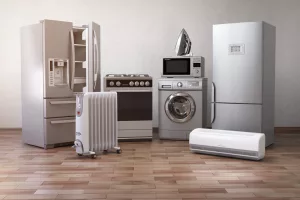Household appliances may be getting cheaper all the time, but they’re still worth maintaining. Appliances do more work than you realize and their condition can have a big impact on the value of your home – not to mention your expenses. Check out these maintenance tips for keeping your major appliances in tip-top shape.

Refrigerator Maintenance
New refrigerators should sit for several hours before being plugged in
Life Expectancy: 17 years
Maintenance: Minimal (Dusting coils, cleaning)
Everyone has a fridge. Some homes even have two or three. The nice thing about refrigerators is that they require little maintenance. A fridge takes heat from inside and pumps it out using a refrigerant, keeping the inside at about 4°C (just above freezing). The refrigerant never needs to be replaced, but the coils it runs through at the back of the fridge should be vacuumed on occasion. When dust settles on these coils, it insulates them, making it harder for the appliance to get rid of heat. New fridges often have covers over the coils, to protect them from dust. In that case, the maintenance should be pretty much zero.
All fridges produce water as a by-product of refrigeration and have a drain pan at the bottom. This pan is constantly getting wet and drying again, so it may accumulate mold. In that case, it can be slid out and cleaned once in a while.
And one important tip about brand-new refrigerators: They should be allowed to sit for at least a few hours before plugging them in. This allows the oil in the compressor to settle before the pump starts. If the fridge is laid down for transport, appliance repair specialists sometimes recommend that a new fridge sit at room temperature for up to 24 hours before being plugged in. The compressor oil ends up filling the refrigerant lines and there might not be any for the pump at all, leading to friction and damage. if it has been laid down.
Freezer or Deep-Freeze Maintenance
Life Expectancy: 21 years
Maintenance: None to minimal (De-icing, cleaning)
Freezers or deep-freezes keep food frozen solid – usually at temperatures ranging from -10 to -20 degrees Celcius. A freezer will likely operate for many years with little or no maintenance. The only thing you may need to do is de-ice a freezer, and most models even do that themselves now. To de-ice your freezer, you can empty it and unplug it, or turn up the freezer’s thermostat so that it’s warm enough to let that ice melt.
Freezers also have the same kinds of mechanisms as fridges, so it’s a good idea to let them sit for a few hours after transporting them to let the compressor oil settle.
Frost-free freezers will have a drain pan like a fridge, so mold growth could be an issue there. If mold is a concern, be sure to slide out the pan and clean it once and a while with a bleach and water solution. Also, if you are planning to unplug your freezer for any length of time, the door must be propped open to allow the air to circulate. Any trapped moisture could allow it to mildew inside as well.
Range or Stove Maintenance
The condition of your appliances can have a big impact on the value of your home
[infolist]Life Expectancy: 18
Maintenance: Minimal (cleaning)[/infolist]
Ranges (or stoves) come in all shapes and sizes. Most stoves are electric, but lately more gas ranges are popping up – especially in high-end kitchens. Besides cleaning and the occasional light bulb change, almost nothing needs to be done to an electric range. When it comes to gas and induction ranges, low-maintenance is pretty much the norm. Electric ovens with ceramic cooktops can be hard to clean, and special cleaners may have to be used to keep the surface smooth.
Cleaning an oven can also be trouble because heat bakes on oils and sugars, welding them to the painted ceramic coating. Self-cleaning ovens have made cleanup much more manageable, but the self-cleaning setting uses a lot of electricity and takes a long time. As for cleaning the burner drip pans (bowls), they are apparently close to impossible to clean, so replacement is the only option if you want them to look good-as-new.
Clothes Dryer Maintenance
Life Expectancy: 18 years
Maintenance: Minimal (cleaning)
Not much can go wrong with a clothes dryer, really. It’s a simple device: just a motor, heating element, timer and some switches. The only thing to remember here is that dryers produce a lot of lint, and that lint builds up in more places than just the lint trap. First off, make sure to clean the lint trap every cycle. Otherwise, the dryer will have to work harder and longer to dry your clothes – and that means more heat buildup and even a risk of fire.
Besides the trap, there are dryer vents that send steam and heat to the outside of your home, and they may get clogged with lint as well. Dryer vents should be cleaned every year to make sure they are free of lint and debris. They may even contain birds nests. Clogged vents can cause dryers to trip the safety switch that protects the appliance’s components from heat buildup. Unfortunately, by the time that happens that heat may have already shortened the lifespan of some dryer components. Lastly, the dryer itself can get filled with lint. When I took my dryer apart to fix a broken heating coil, I found enough lint to make a sweater. I think this is quite the fire hazard and would recommend checking the inside of the dryer body itself every few years.
Washing Machine Maintenance
Life Expectancy: 14 years
Maintenance: Minimal (check seals to prevent leaks)
There isn’t much to worry about with a washer if you take good care of it. If you have an older washing machine, leaks are something to consider. Although they are not very common, they can be a big mess, especially if your washing machine is on an upper floor of your home. The most common leaks actually occur where the water lines attached to the washer, so braided steel lines are recommended and over-tightening should be avoided, as this can crack the washer’s plastic threads. Sometimes other little plastic parts will wear out and can be replaced, but you really have to wait until they break.
In the preventative maintenance area, be sure not to overfill the clothes washer with clothing as this is hard on the motor, transmission and balancers. Also avoid adding excess detergent, as it will cause a build-up in the machine. If your municipality has hard water like Edmonton does, you should also run some vinegar through the cycle every once in a while with hot water to prevent calcium build-up.
Dishwasher Maintenance
If left unused too long, the seals in your dishwasher can dry out and crack, letting water escape
Life Expectancy: 13
Maintenance: Minimal (trap cleaning, checking seals)
If you expected someone to wash as many dishes as a dishwasher can over its lifetime, I bet they wouldn’t last long in the job. Dishwashers often run every day for their entire life – sometimes twice a day. When you think about that, you can see why they don’t have the same lifespan as washing machines or dryers. Still, if you keep your dishwasher in good shape, it’ll keep doing its job for many years and it’ll do that job cheaper than you could by hand.
The most important thing to remember about a dishwasher is that it has seals inside of it, and those seals are meant to stay wet. This is why it’s not a good idea to let your dishwasher sit for many weeks without running it because this can cause the seals to dry out and crack, letting water seep onto your kitchen floor. If you plan on going away, you can pour some mineral oil and water into the bottom of the dishwasher keep those seals well moisturized.
It doesn’t take much to keep major appliances running well. Most are built to last, and newer models have taken care of many of the issues that plagued their predecessors. By completing a few simple tasks, you can make sure that your appliances last as long as possible. After all, they may be less expensive than they used to be, but I’ll bet you can think of better things to do with your money.
Note: Life expectancies are industry averages, provided by Natural Resources Canada
by +Alan F Macdonald REALTOR® | Copyright © – gimme-shelter.com
[40004]

